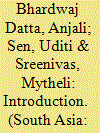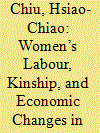| Srl | Item |
| 1 |
ID:
178861


|
|
|
|
|
| Summary/Abstract |
This Introduction frames a collection of papers that explore the roles played by women—as volunteers, organisers, bureaucrats, politicians and citizens—in shaping the emerging ideologies and structures of independent India. Although women’s participation is both understudied and inadequately theorised in existing scholarship, the papers in this collection demonstrate that the decades following India’s Independence witnessed the participation of women in every sphere of politics and nation-building. The introductory essay tracks the limits and possibilities of women’s agency and gendered citizenship in these spheres to historicise the women’s movement during the post-Independence decades, and to examine its fraught relationship with feminism, patriarchal society and state politics.
|
|
|
|
|
|
|
|
|
|
|
|
|
|
|
|
| 2 |
ID:
168156


|
|
|
|
|
| Summary/Abstract |
This article uses the life stories of three women in Jinmen to demonstrate women’s economic agency in bettering the livelihood of their families in circumstances largely shaped by Cold War geopolitics and the authoritarian state’s military strategies. It argues that women’s devotion of their labour and earnings to their families was part of the reproductive processes of the kinship system, but also important to their building of social reputation and emotional ties with their loved ones. Moreover, the state’s campaign to protect traditional Chinese culture, framed within bipolar politics, supported the ideological reproduction of women’s primary roles being in the domestic sphere. While the lives of Jinmen civilians were significantly distorted in the Cold War era, their experiences of economic improvement and a certain stability in their ways of life – revolving around kinship – account for the ambivalence they now feel towards the period of authoritarian rule.
|
|
|
|
|
|
|
|
|
|
|
|
|
|
|
|